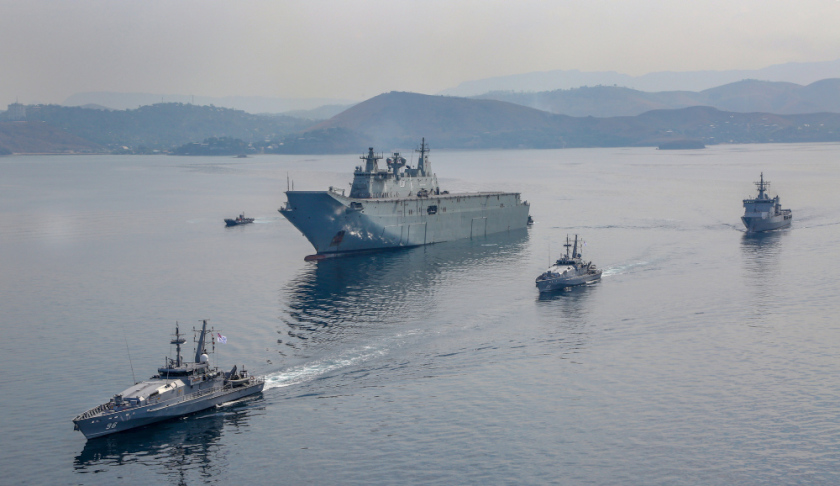The Mozambique Channel hosts 30 per cent of the world’s tanker shipping. Could a local insurgency disrupt international trade?
To continue reading the rest of this article, please log in.
Create free account to get unlimited news articles and more!
International commerce may be severely impacted by recent conflict in the Indian Ocean. This recent conflict isn’t the stalemate between the US and its allies in their quest for naval dominance but, interestingly, by the recent internal strife in Mozambique. Mozambique’s government instability, and its fallout into the Indian Ocean, has the ability to disrupt up to 30 per cent of global shipping traffic that happens to pass through the Mozambique Channel. This threat to global commerce should serve as a call to action to the Quad nations to step up and stabilise this crucial region.
This is the argument presented by Dr David Brewster in the Lowy Institute’s Interpreter this week. Dr Brewster of ANU’s National Security College and research fellow at the Australia India Institute presented his insights into this dynamic region as part of a two-year research undertaking by ANU and Department of Defence.
An Islamist insurgency began in Mozambique in 2017 and has subsequently resulted in the displacement of 600,000 people across the nation. Indeed, conflict has spread into bordering countries such as Tanzania, which felt the brunt of a terror attack last year that took the lives of 300 people. Allegations have also arisen that the Islamists are in contact with members of Islamic State backed terror groups in Somalia. This internal turmoil has resulted in threats to vital international trade networks, Dr Brewster contends.
Although international solutions to the problem have come to naught. Recent dialogue between Mozambique and Tanzania have been further marred with finger pointing between the two nations, with Tanzania accusing Islamists of using Mozambique as a springboard to mount terror attacks.
“There are also growing attacks on maritime infrastructure. In August, insurgents seized a key port in northern Mozambique from government forces, raising concerns that this is a first step in insurgents venturing into piracy, as occurred in the Horn of Africa,” Dr Brewster argues.
This lawlessness has deteriorated Mozambique’s ability to combat international crime, with drug traffickers using the country as a staging platform for the heroin and crystal meth trades.
Despite this, Dr Brewster notes that Mozambique has an abundance of resources that international corporations have been keen to invest in. This includes some 100 trillion cubic feet of gas, though Mozambique's recent attacks have prompted foreign companies to move their headquarters overseas.
“The Mozambique government, which is in severe debt distress, is unable to take effective action against the insurgency, and has increasingly relied on mercenaries. But it has been somewhat reluctant to accept international assistance,” he continues.
The international response thus far, as described by Dr Brewster, appears haphazard. The French who have typically relied on a superior naval presence in the region to maintain order currently do not have the available support, while Portugal seems ready to provide some 1,400 military personnel to train the Mozambique military. Meanwhile, South Africa is in the process of creating a forward operating base in South Africa’s north, though Mozambique “appears reluctant to involve African partners”.
Should the Quad step up and protect international interests on the coast of Mozambique?
Firstly, the US is in the process of finalising counterinsurgency support to the Mozambique government, which will hopefully secure much needed training and support to the government. Secondly, the Indian Navy has shown eagerness to flex its naval muscles in the region, having undertaken joint naval exercises with the French and stationing Poseidon aircraft in the area. However, Australia recently decreased its presence in the region having helped the international community to combat the drugs trade.
Perhaps this could afford the alliance a new chance to demonstrate their capabilities.
“The crisis should also be seen an opportunity for countries such as France and India to demonstrate their value as security partners in the region. It may also be an opportunity to build co-operation with South Africa, which is increasingly a 'swing state' in geopolitical competition. Failure to contain the conflict will leave a vacuum for other actors to fill," Dr Brewster contends.
Indeed, offering support to these nations may greatly impact our global standing and afford Australia the opportunity to make a strong interconnected global security network.
Get involved with the discussion and let us know your thoughts on Australia's future role and position in the Indo-Pacific region and what you would like to see from Australia's political leaders in terms of partisan and bipartisan agenda setting in the comments section below, or get in touch with

 Login
Login







